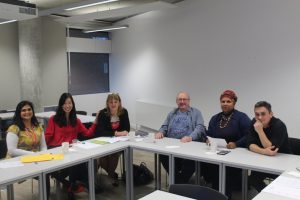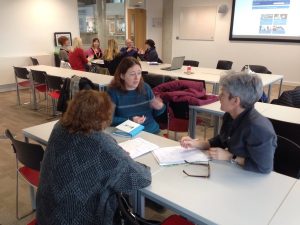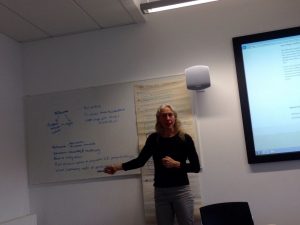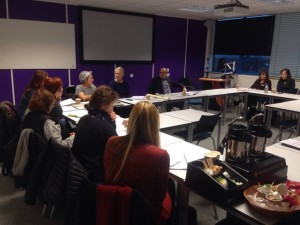
Dr. Jaeyeon Choe, Dr. Varuni Wimalasiri, Dr. Nicola De Martini Ugolottiand, and Dr. Jayne Caudwell in Faculty of Management organised the Refugee and Migrant Leisure Network workshop on December 5th with community partners including Dorset Race Equality Council and Unity in Vision.
During the two-hour workshop, we discussed how to support refugee and migrant communities in Dorset including ‘vocation’ and language learning. We also discussed other mechanisms that help their re-settlement and integration such as cooking workshops, community events, music and art, all which might provide a broader scope of support such as social and emotional/psychological well-being.
We agreed that we need to listen to refugee and migrant ‘voices’ for their settlement, integration, meaning making and well-being in order to develop supportive programmes. It’s often seen that existing programmes don’t meet what refugee and migrant populations actually need. There is an urgent need to listen to their problems, challenges, so as to develop effective support programmes.
We also discussed ‘qualitative’ data that community organisations often collect including stories, lived experiences and anecdotes do not communicate well with policy makers. What will be an effective strategy to convert the ‘messy’ data (from community events, sport, music, and art) into policy making? This is a challenge for both community organisations and researchers.
Our community partners also shared that they are facing new challenges (ie funding). All councils and community organisations face difficulties in developing, managing and ‘sustaining’ support systems for refugee and migrant populations. Whilst discussing the role of a local university when supporting refugee and migrant issues, securing some funding can be one area to work on for both researchers and community groups. For example, Dr. Jaeyeon Choe recently applied for a grant with two of the community partners to support their activities as well as her own research. The proposal focuses on Syrian refugee resettlement, belonging, subjective well-being and community ‘food’ events in rural UK. We are also looking into larger/future collaborative funding opportunities together.
For BU academics, it was very fruitful to listen to and learn from community workers about refugee and migrant issues in Dorset and beyond. Besides the productive discussions, it was inspiring to see people who are passionate about supporting and working hard for refugee and migrant communities!
If you are interested in our network, please follow us:
https://m.facebook.com/groups/400355213641367?tsid=0.41635546925909617&source=result















 SPROUT: From Sustainable Research to Sustainable Research Lives
SPROUT: From Sustainable Research to Sustainable Research Lives BRIAN upgrade and new look
BRIAN upgrade and new look Seeing the fruits of your labour in Bangladesh
Seeing the fruits of your labour in Bangladesh Exploring Embodied Research: Body Map Storytelling Workshop & Research Seminar
Exploring Embodied Research: Body Map Storytelling Workshop & Research Seminar Marking a Milestone: The Swash Channel Wreck Book Launch
Marking a Milestone: The Swash Channel Wreck Book Launch ECR Funding Open Call: Research Culture & Community Grant – Application Deadline Friday 12 December
ECR Funding Open Call: Research Culture & Community Grant – Application Deadline Friday 12 December MSCA Postdoctoral Fellowships 2025 Call
MSCA Postdoctoral Fellowships 2025 Call ERC Advanced Grant 2025 Webinar
ERC Advanced Grant 2025 Webinar Update on UKRO services
Update on UKRO services European research project exploring use of ‘virtual twins’ to better manage metabolic associated fatty liver disease
European research project exploring use of ‘virtual twins’ to better manage metabolic associated fatty liver disease